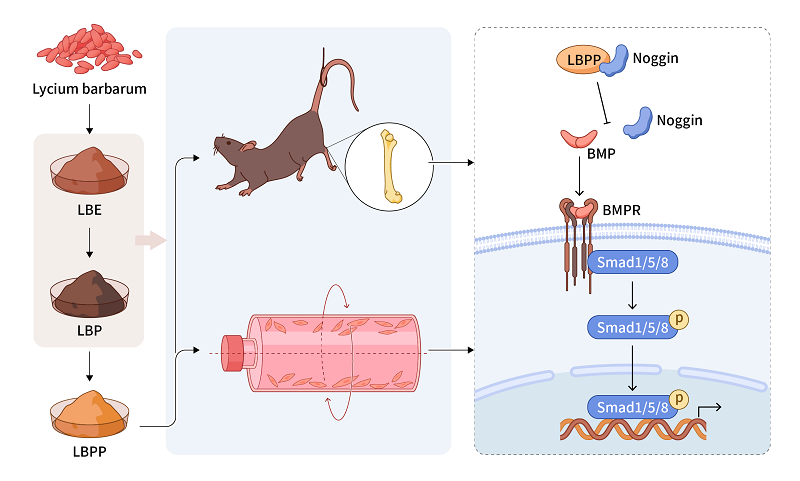Lycium barbarum Polysaccharide Ameliorates Disuse Bone Loss by Activating BMP Signaling
Disuse bone loss is a metabolic bone disease caused by prolonged physical inactivity, such as long-term bed rest in patients or extended space missions under microgravity experienced by astronauts. The underlying pathological mechanisms remain incompletely understood, and there are currently no targeted therapeutic drugs available. Compendium of Materia Medica (Ben Cao Gang Mu) records that Lycium barbarum (L. barbarum) possesses the effects of "long-term consumption strengthens tendons and bones, lightens the body, slows aging, and enhances resistance to cold and heat," though its scientific basis has remained unclear.
On July 10, 2025, a collaborative study from the Institute of Biophysics, and the Shanghai Institute of Materia Medica of the Chinese Academy of Sciences, was published in The FASEB Journal. This study for the first time elucidates the bioactive substance, molecular mechanism, and target through which L. barbarum exerts its bone-strengthening effects by promoting bone formation and alleviating disuse bone loss, thereby shedding light on the scientific foundation of the traditional efficacy of "strengthening bones."
Using hindlimb-unloaded mice and pre-osteoblast MC3T3-E1 cells under simulated microgravity as models, the researchers found that L. barbarum water extract (LBE), L. barbarum polysaccharide (LBP), and a purified polysaccharide fraction LBPP all exhibited protective effects against bone loss in the mouse model.
These components significantly mitigated disuse bone loss by enhancing bone mineral density and improving microstructural parameters, while reversing the microgravity-induced inhibition of osteoblast differentiation. These findings identify LBPP as the key pharmacologically active component responsible for promoting bone formation in L. barbarum's action against disuse bone loss.
Both in vivo mouse experiments and in vitro cell studies demonstrated that LBE, LBP, and LBPP can promote bone formation. Further molecular interaction assays confirmed that LBPP directly binds to Noggin, an inhibitor of bone morphogenetic proteins (BMPs), thereby activating the BMP/Smads signaling pathway and promoting osteogenesis to counteract disuse bone loss.
This study reveals the clinical potential of L. barbarum in mitigating bone loss caused by microgravity or prolonged bed rest. LBPP emerges as a promising natural compound for the prevention and treatment of disuse bone loss in aging, immobility, or spaceflight-related conditions.

Figure. Schematic Illustration of L. barbarum Polysaccharide Promoting Bone Formation to Alleviate Disuse Bone Loss and Exert Bone-Strengthening Effects
(Image by CHEN Chang's group)
Article link: http://dx.doi.org/10.1096/fj.202403082R
Contact: CHEN Chang
Institute of Biophysics, Chinese Academy of Sciences
Beijing 100101, China
E-mail: changchen@ibp.ac.cn
(Reported by Prof. CHEN Chang's group)

